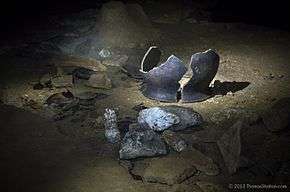Che Chem Ha Cave
 | |
| Alternate name | Poison Water Cave |
|---|---|
| Location | 8 miles southeast of Benque |
| Region | Cayo District |
Che Chem Ha Cave or Chechem Ha Cave is a Mayan Ceremonial Cave, known to be a major tourist destination. It is located 8 miles southeast of Benque at the start of the Maya Mountains of Belize. [1]
Description
The Che Chem Ha Cave (Poison Water Cave) entrance is a small hole which leads to the main tunnel (200m long), this tunnel connects to a large chamber which then connects many other small chambers high up within the cave. This cave contains many ancient Mayan artifacts so it is heavily protected to ensure the preservation of these items so visitors are only allowed to enter when escorted by a tour guide.
Discovery
This cave was first discovered in 1989 by a local farmer, William Morales, while he was hunting with his dog. His dog ran into a hole within a mountain of boulders and he followed the dog and discovered the entrance of the cave. After Morales entered the cave he stumbled across hundreds of pottery vessels and other untouched artifacts left behind by the Mayans.[2][3]
Archaeology
This cave contains a main chamber filled with rocks lined up which is believed to have been used for sacred Mayan rituals dating from the middle preclassic period (900-300BC) to the late classic period (700-850AD). Also, there are many chambers found high up within the cave which contain many large pottery vessels which may have been used to collect 'pure water' to be used for their rituals. [4] [5]
References
- ↑ Joshua Samuel Brown,Mara Vorhees, "Chechem Ha Cave", Lonely Planet Belize, Lonely Planet, Aug 1, 2013
- ↑ Holley Moyes, Jaime J. Awe, George A. Brook, and James W. Webster, THE ANCIENT MAYA DROUGHT CULT: LATE CLASSIC CAVE USE IN BELIZE, Latin American Antiquity, 2009
- ↑ Richard Mahler , Jaguar's Shadow: Searching for a Mythic Cat,Yale University Press, May 14, 2014
- ↑ Holley Moyes , Sacred Darkness: A Global Perspective on the Ritual use of Caves, University Press of Colorado, Sep 1, 2012
- ↑ Gyles Iannone, The Great Maya Droughts in Cultural Context: Case Studies in Resilience and Vulnerability University Press of Colorado, Dec 15, 2013